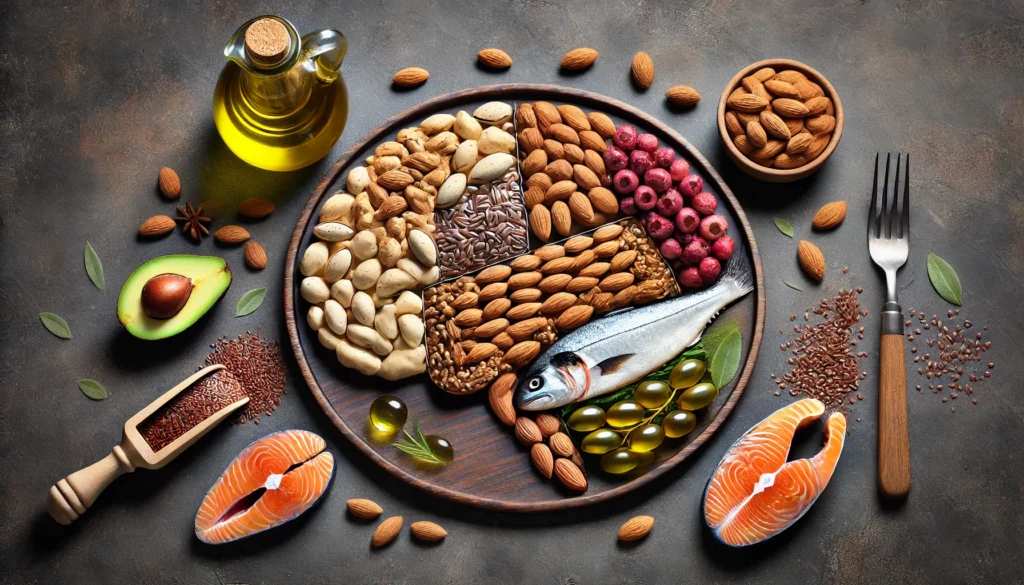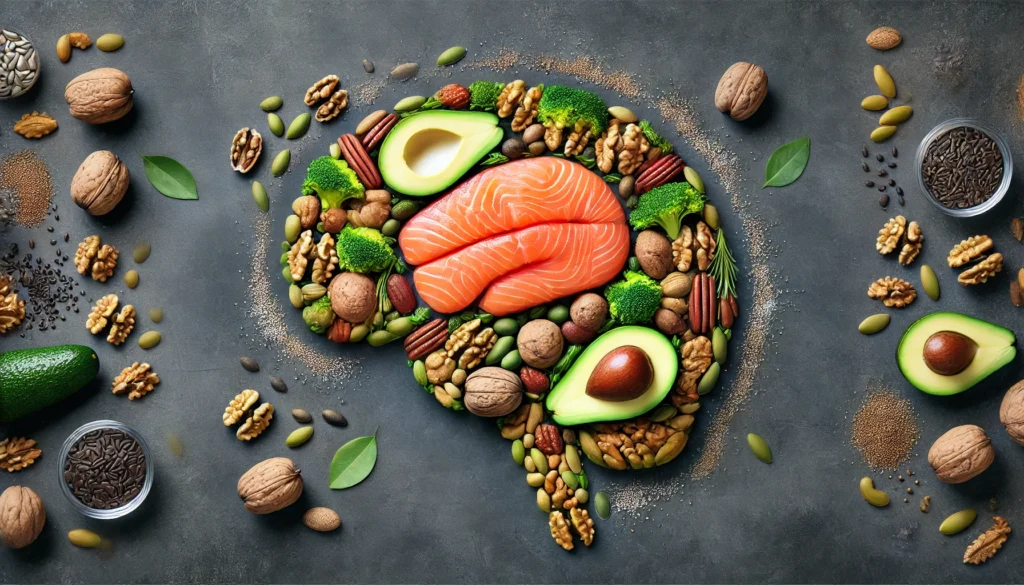When we think about maintaining brain health, our minds often turn to cognitive exercises, puzzles, or even meditation. However, an essential component of cognitive well-being lies within our diet—specifically, the intake of essential fats. These fats are crucial for optimal brain function and development. This article will delve into the vital role that healthy fats play in brain health, exploring their historical context, current scientific understanding, and future implications. We’ll also provide practical advice on how to incorporate these fats into your daily diet.
You may also like: Memory-Boosting Foods You Should Try Today
Understanding the Brain’s Need for Fats
The human brain is a complex organ, comprising nearly 60% fat, making it the fattiest organ in the body. This composition underscores the importance of fats in brain health. These fats are integral to building cell membranes and affect the brain’s structure and function. Without adequate fat, the brain cannot operate efficiently.
The Structure of the Brain and Its Fat Composition
The brain’s composition includes various types of fats, each playing a unique role. The presence of phospholipids, cholesterol, and essential fatty acids is vital for maintaining the fluidity and functionality of brain cell membranes. The intricate balance of these fats ensures proper signaling and neurotransmitter function.
The Role of Fats in Neural Development
During developmental stages, particularly in infancy and childhood, fats are crucial for brain growth and cognitive development. Adequate intake of essential fats during these periods supports synaptogenesis and myelination, processes vital for effective neural communication and cognitive skills acquisition.
Fats and Brain Energy Metabolism
Fats are not only structural components but also energy sources for the brain. They provide a steady energy supply, ensuring sustained cognitive functions and focus. The brain’s reliance on fats as a fuel source becomes especially apparent during periods of fasting or low carbohydrate intake.
Types of Fats: The Good, the Bad, and the Ugly
Fats come in various forms, each with different impacts on brain health. Understanding these differences is crucial for making informed dietary choices.
Saturated Fats and Their Impact on Brain Health
Saturated fats are often found in animal products and some plant oils. While they are necessary in small amounts for certain bodily functions, excessive intake has been linked to increased cholesterol levels. This can adversely affect brain health, potentially leading to cognitive decline and increased risk of neurodegenerative diseases.
Trans Fats: Hidden Dangers Lurking in Processed Foods
Trans fats, commonly found in processed and fried foods, are detrimental to brain health. They contribute to inflammation and oxidative stress, which can impair cognitive functions. Long-term consumption of trans fats is associated with a higher risk of developing depression and other mood disorders.
Unsaturated Fats: The Champions of Brain Health
Unsaturated fats, including monounsaturated and polyunsaturated fats, are the heroes of brain health. Found in nuts, seeds, fish, and plant oils, these fats support brain function, enhance memory, and protect against cognitive decline. They also help reduce inflammation and improve overall brain resilience.

Omega-3 and Omega-6 Fatty Acids: The Brain’s Best Allies
Two types of polyunsaturated fats, omega-3 and omega-6 fatty acids, are essential for brain health. They play a critical role in cognitive function, memory, and mood regulation.
The Importance of Omega-3 Fatty Acids
Omega-3 fatty acids, including EPA, DHA, and ALA, are crucial for brain health. DHA, in particular, is a major structural component of the brain and retina. It supports cognitive function, reduces inflammation, and promotes neuroplasticity, enabling the brain to adapt and reorganize itself.
Balancing Omega-6 Fatty Acids in the Diet
While omega-6 fatty acids are essential for health, the typical Western diet often contains an excess of them compared to omega-3s. This imbalance can promote inflammation and negatively impact brain health. Achieving a balanced intake of omega-3 and omega-6 is vital for maintaining a healthy inflammatory response in the brain.
Synergistic Effects of Omega-3 and Omega-6 Fatty Acids
When consumed in the right balance, omega-3 and omega-6 fatty acids work synergistically to support brain health. They contribute to the structural integrity of brain cells and influence neurotransmitter function, ultimately enhancing mood regulation and cognitive performance.
Historical Context of Dietary Fats
Throughout history, fats have played a pivotal role in human evolution and diet. Early human diets were rich in omega-3 fatty acids, primarily from fish and wild game, which likely contributed to the development of larger and more complex brains.
Ancient Diets and Brain Evolution
In ancient times, diets were naturally rich in healthy fats due to the consumption of wild game, fish, and plant-based sources. These diets provided ample omega-3 fatty acids, essential for brain development and cognitive evolution, aiding early humans in adapting to their environments.
Industrialization and Dietary Changes
The 20th century saw a dramatic shift in dietary patterns with the advent of industrialization and processed foods. This change led to an increase in the consumption of unhealthy fats, such as trans fats, and a decrease in the intake of healthy fats. These shifts have had significant implications for brain health, contributing to a rise in cognitive health issues.
The Reemergence of Traditional Diets
In recent years, there has been a renewed interest in traditional diets that emphasize whole foods and healthy fats. The resurgence of diets like the Mediterranean and Nordic diets highlights the benefits of returning to eating patterns rich in omega-3s and other unsaturated fats, which support brain health and longevity.
Current Trends in Brain Health and Fats
Today, there is a growing awareness of the importance of fats for brain health. The focus has shifted towards incorporating more healthy fats into our diets to support cognitive function.
The Mediterranean Diet: A Model for Brain Health
Numerous studies have shown that diets rich in unsaturated fats, particularly the Mediterranean diet, are linked to a lower risk of cognitive decline and Alzheimer’s disease. These diets emphasize the intake of omega-3-rich foods like fish, nuts, and olive oil, which support brain health and overall well-being.
The Role of Functional Foods
Functional foods enriched with essential fats are gaining popularity as a means to enhance brain health. Foods like fortified dairy products, omega-3-enriched eggs, and plant-based alternatives offer convenient ways to boost fat intake and improve cognitive function.
Supplements and Biohacking for Cognitive Enhancement
In the realm of biohacking, there is an increasing interest in using supplements to optimize brain health. Omega-3 supplements, such as fish oil, are popular for their potential cognitive benefits. These supplements can provide a concentrated source of essential fats, particularly for those who struggle to get enough from their diet.
Practical Advice for Incorporating Healthy Fats
Integrating healthy fats into your diet doesn’t have to be complicated. Here are some practical tips to get you started:

Choosing the Right Sources of Fats
- Fish: Opt for fatty fish like salmon, mackerel, and sardines, which are rich in omega-3 fatty acids. Incorporating these into your meals a few times a week can significantly boost your intake of essential fats.
- Nuts and Seeds: Walnuts, flaxseeds, and chia seeds are excellent sources of healthy fats. Including a variety of nuts and seeds in your snacks or meals can provide a diverse range of beneficial nutrients.
- Oils: Use olive oil or avocado oil for cooking and dressings. These oils are rich in monounsaturated fats and can enhance the flavor and nutritional profile of your dishes.
Practicing Mindful Eating
- Balance Omega-3 and Omega-6: Aim for a balanced ratio by reducing processed food intake and increasing omega-3-rich foods. Being mindful of your food choices can help maintain a healthy balance between these essential fatty acids.
- Limit Trans and Saturated Fats: Avoid processed snacks and opt for whole, unprocessed foods. Making conscious choices to limit unhealthy fats can have a positive impact on your brain health and overall well-being.
Incorporating Fats into Daily Meals
- Breakfast: Add flaxseeds or chia seeds to your morning smoothie or oatmeal for a boost of healthy fats. Including avocado in your breakfast can also provide a creamy texture and additional nutrients.
- Lunch and Dinner: Use olive oil-based dressings for salads and cook with healthy oils to enhance the flavor and nutritional value of your meals. Incorporating fatty fish or a handful of nuts into your lunch or dinner can further support your brain health.
Future Implications and Research Directions
The exploration of fats and brain health is an evolving field, with promising research on the horizon. Scientists are investigating the potential of specific fatty acids in preventing and treating neurodegenerative diseases.
Personalized Nutrition and Brain Health
The future may see the rise of personalized nutrition, where diets are tailored to individual genetic profiles to optimize brain health. This approach could lead to more effective dietary recommendations and interventions, allowing individuals to make informed choices about their fat intake based on their unique needs.
Emerging Therapies Targeting Fat Metabolism
Innovative therapies involving the manipulation of dietary fats are being explored to enhance cognitive function and treat brain disorders. These advancements hold the potential to revolutionize brain health management, offering new avenues for prevention and treatment.
The Role of Technology in Dietary Fat Research
Advancements in technology are enabling researchers to delve deeper into the relationship between dietary fats and brain health. Tools like neuroimaging and metabolomics are providing new insights into how different types of fats impact brain function, paving the way for targeted nutritional interventions.

Conclusion
Essential fats play a pivotal role in maintaining and optimizing brain health. By understanding the types of fats that benefit the brain and incorporating them into your diet, you can support cognitive function and overall well-being. As research continues to unfold, the future holds exciting possibilities for harnessing the power of fats to enhance brain health. Prioritize the inclusion of healthy fats in your diet today for a sharper, healthier tomorrow.
Further Reading:
New Research Finds Saturated Fats Can Lower Change of Cognitive Function Over Time
Foods linked to better brainpower
Impact of Dietary Fats on Brain Functions
Important Note: The information contained in this article is for general informational purposes only, and should not be construed as health or medical advice, nor is it intended to diagnose, prevent, treat, or cure any disease or health condition. Before embarking on any diet, fitness regimen, or program of nutritional supplementation, it is advisable to consult your healthcare professional in order to determine its safety and probable efficacy in terms of your individual state of health.
Regarding Nutritional Supplements Or Other Non-Prescription Health Products: If any nutritional supplements or other non-prescription health products are mentioned in the foregoing article, any claims or statements made about them have not been evaluated by the U.S. Food and Drug Administration, and such nutritional supplements or other health products are not intended to diagnose, treat, cure, or prevent any disease.


